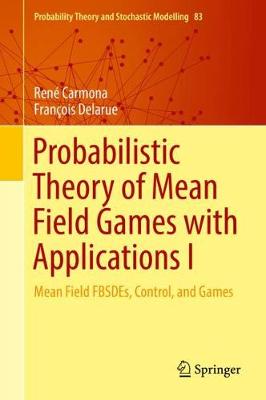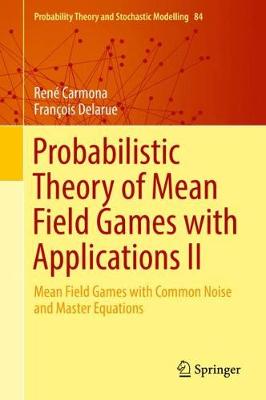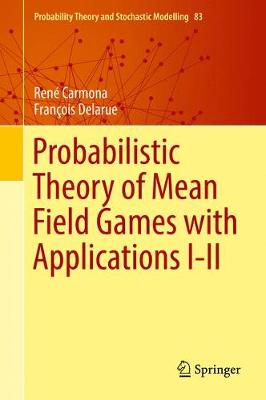Probability Theory and Stochastic Modelling
2 primary works • 3 total works
Book 83
Probabilistic Theory of Mean Field Games with Applications I
by Rene Carmona and Francois Delarue
This two-volume book offers a comprehensive treatment of the probabilistic approach to mean field game models and their applications. The book is self-contained in nature and includes original material and applications with explicit examples throughout, including numerical solutions.
Volume I of the book is entirely devoted to the theory of mean field games without a common noise. The first half of the volume provides a self-contained introduction to mean field games, starting from concrete illustrations of games with a finite number of players, and ending with ready-for-use solvability results. Readers are provided with the tools necessary for the solution of forward-backward stochastic differential equations of the McKean-Vlasov type at the core of the probabilistic approach. The second half of this volume focuses on the main principles of analysis on the Wasserstein space. It includes Lions' approach to the Wasserstein differential calculus, and the applications of its results to the analysis of stochastic mean field control problems.
Together, both Volume I and Volume II will greatly benefit mathematical graduate students and researchers interested in mean field games. The authors provide a detailed road map through the book allowing different access points for different readers and building up the level of technical detail. The accessible approach and overview will allow interested researchers in the applied sciences to obtain a clear overview of the state of the art in mean field games.
Book 84
Probabilistic Theory of Mean Field Games with Applications II
by Rene Carmona and Francois Delarue
This two-volume book offers a comprehensive treatment of the probabilistic approach to mean field game models and their applications. The book is self-contained in nature and includes original material and applications with explicit examples throughout, including numerical solutions.
Volume II tackles the analysis of mean field games in which the players are affected by a common source of noise. The first part of the volume introduces and studies the concepts of weak and strong equilibria, and establishes general solvability results. The second part is devoted to the study of the master equation, a partial differential equation satisfied by the value function of the game over the space of probability measures. Existence of viscosity and classical solutions are proven and used to study asymptotics of games with finitely many players.
Together, both Volume I and Volume II will greatly benefit mathematical graduate students and researchers interested in mean field games. The authors provide a detailed road map through the book allowing different access points for different readers and building up the level of technical detail. The accessible approach and overview will allow interested researchers in the applied sciences to obtain a clear overview of the state of the art in mean field games.83-84
Probabilistic Theory of Mean Field Games with Applications I-II
by Rene Carmona and Francois Delarue
Volume I of the set is entirely devoted to the theory of mean field games without a common noise, whereas Volume II analyzes mean field games in which the players are subject to games with a common noise.
Together, both Volume I and Volume II will benefit researchers in the field as well as PhD and graduate students working on the subject due to the self-contained nature and applications with explicit examples throughout.


